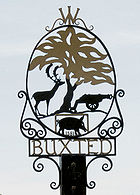
Ralf Hogge
Encyclopedia

Working with French-born cannon-maker Pierre Baude and for his employer, parson William Levett
William Levett (vicar)
William Levett was an English clergyman. An Oxford-educated country rector, he was a pivotal figure in the use of the blast furnace to manufacture iron...
, Hogge succeeded in casting the first iron cannon
Cannon
A cannon is any piece of artillery that uses gunpowder or other usually explosive-based propellents to launch a projectile. Cannon vary in caliber, range, mobility, rate of fire, angle of fire, and firepower; different forms of cannon combine and balance these attributes in varying degrees,...
in England
England
England is a country that is part of the United Kingdom. It shares land borders with Scotland to the north and Wales to the west; the Irish Sea is to the north west, the Celtic Sea to the south west, with the North Sea to the east and the English Channel to the south separating it from continental...
, in 1543. After Levett
Levett
Levett is an Anglo-Norman territorial surname deriving from the village of Livet-en-Ouche, now Jonquerets-de-Livet, in Eure, Normandy. Ancestors of the earliest Levett family in England, the de Livets were lords of the village of Livet, and undertenants of the de Ferrers, among the most powerful of...
's death, Hogge went into business for himself, producing cannons with the process he had helped perfect.
Hogge's increasing skill at his profession as well as his burgeoning business was manifest in 1560, when Hogge ceased to be known as 'servant to Parson Levett'; after that date, he was "Mr. Ralf Hogge, gentleman." The revolution in English ironfounding had brought a humble tradesman to the status of country squire.
This event was immortalised in verse as:
- Master Huggett and his man John
- they did cast the first cannon.
In the village of Buxted
Buxted
Buxted is a village and civil parish in the Wealden District of East Sussex in England. The parish is situated on the Weald, north of Uckfield; the settlements of Five Ash Down, Heron's Ghyll and High Hurstwood are included within its boundaries...
, East Sussex
East Sussex
East Sussex is a county in South East England. It is bordered by the counties of Kent, Surrey and West Sussex, and to the south by the English Channel.-History:...
, "Hogge is assumed to have built Hogge House in 1583 and recorded his name and the date in the form of a cast iron rebus over the door."
Ralf Hogge married Margaret Henslowe, sister of Philip Henslowe
Philip Henslowe
Philip Henslowe was an Elizabethan theatrical entrepreneur and impresario. Henslowe's modern reputation rests on the survival of his diary, a primary source for information about the theatrical world of Renaissance London...
, an Elizabethan theatrical entrepreneur and impresario. Philip Henslowe diaries between 1592 and 1609 survive. As well as providing an insight into Elizabethan theatre of that period, they were written on the reverse of Hogge's ironworks accounts for the period 1576 to 1581. They give an in-depth look into the business and casting methods of an early ironmaster.
External links
- http://www.landguard.com/casting.htm Web page with information about Hogge
- An Archaeological Interpretive Survey of Huggett's Furnace Farm House, Hadlow Down, Mayfield, East Sussex, David Martin FSA and Barbara Martin AIFA
Further reading
- The Queen's Gunstonemaker: An Account of Ralph Hogge, Elizabethan Ironmaster & Gunfounder, Edmund Teesdale, Lindel Publishing Company, Seaford, Sussex, 1984

